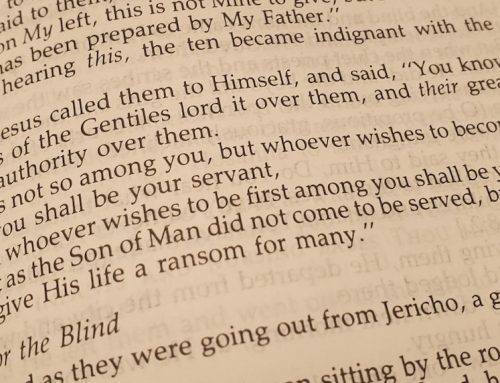Was Genesis written by Moses, or mashed up from unknown sources by unknown editors, as proponents of something called the Documentary Hypothesis (DH) would like us to believe? Maybe neither, as it turns out. There is an alternative hypothesis that makes a lot of sense and still allows for the divine caretaking of the history of mankind.
Could God have miraculously revealed to Moses direct knowledge of events and private conversations that he himself was not privy to in order to create the book of Genesis? Absolutely. But is that the most likely explanation? Probably not, in my opinion.
The Wiseman Hypothesis, sometimes called the Tablet Theory, provides a beautifully simple explanation of how Moses could have come into such detailed knowledge of events that happened long before his time. The basis for this persuasive theory is that in ancient Mesopotamia, it was a common practice for the patriarch of a family to record his family history on a tablet and sign it with his name at the end.
When you go through the Genesis record, there are actually many such “signatures” (called colophons, in the study of antiquities) that likely represent the end of one clay tablet source and the beginning of another. If you’re like me, you’ve read them numerous times without even noticing them:
- “These are the generations of the heavens and the earth” (Genesis 2:4)
- “This is the book of the generations of Adam” (Genesis 5:1)
- “These are the generations of Noah” (Genesis 6:9)
- “Now these are the generations of the sons of Noah, Shem, Ham, and Japheth” (Genesis 10:1)
- “These are the generations of Shem” (Genesis 11:10)
- “Now these are the generations of Terah” (Genesis 11:27)
- “Now these are the generations of Ishmael” (Genesis 25:12)
- “And these are the generations of Isaac, Abraham’s son” (Genesis 25:19)
- “Now these are the generations of Esau, who is Edom” (Genesis 36:1)
- “And these are the generations of Esau the father of the Edomites in Mount Seir” (Genesis 36:9)
- “These are the generations of Jacob” (Genesis 37:2)
If these colophons really do represent the end of one tablet and the beginning of another, then Moses was really doing with Genesis exactly what the compiler of 1 and 2 Chronicles, and 1 and 2 Kings did. He was taking existing source documents and compiling them, with divine guidance, into a single set of documents that could be passed down from scribe to scribe, generation to generation. What better history of mankind could we ask for, absent a YouTube video from God?
There is some disagreement about whether these colophons, or signatures, take place at the beginning or end of each source tablet. But the ancient Babylonian practice was to place them at the end, and that makes a lot of sense with the text. After the death of a patriarch, the next generation would close the tablet out in his father’s name, and start a new one of his own.
It was a very practical way for families to pass down a heritage to their progeny. A heritage of information. This is the primary difference between animals and humans. We long for information. Data. Facts. History. Animals simply respond instinctively to what they feel.
Note that this theory is not an attempt to take God out of the process of Biblical authorship. After all, where did the first tablet come from, and who made sure these tablets were passed from one patriarch to the next? And of more interest, who recorded the history—the information—in Adam’s tablet prior to his existence? Since we have record of the hand of God writing on tablets of stone in the story of the Ten Commandments, it’s not far-fetched to think that God, the creator of languge itself (more on that later), handed Adam a clay tablet with the story of creation.
I’ve adopted three, going on four kids. Every one of them have varying amounts of yearning for knowledge of their biological parents. They want to know their story, including where they came from, and why they ended up in my family. As a young, and somewhat naive adoptive parent, I dismissed this craving for knowledge of their roots as “just” a psychological phenomenon that can easily be overcome by the love of the adoptive parent. But I’ve since realized that it runs far deeper than that. This yearning to understand our origins is something God put into our DNA, like animals that instinctively know where to breed.
I believe this instinct to want to know our beginnings is what the clichéd “God-shaped hole inside of all of us” is all about. Pascal (yes, the ground-breaking mathematician) wrote in his defense of theism:
“What else does this craving, and this helplessness, proclaim but that there was once in man a true happiness, of which all that now remains is the empty print and trace? This he tries in vain to fill with everything around him, seeking in things that are not there the help he cannot find in those that are, though none can help, since this infinite abyss can be filled only with an infinite and immutable object; in other words by God himself.”
Blaise Pascal, Pensées VII (425)
As children, we want to know our origins, and we’re more open to God. Then our self-will sets in, and it sinks in that if there’s a God, we’re under a higher authority. So our human nature sets out to rationalize and unlearn what we instinctively knew from a very young age; that we were created with a purpose by an all-powerful God who wants a relationship with us.
If we know what’s good for us, we’ll again seek that relationship with God Almighty, who defines himself as love personified. Only then will our craving for that instinctive knowledge of our origins even come close to being satisfied.
Psalm 107:9 – For he satisfies the longing soul, and the hungry soul he fills with good things.
John 4:13-14 – Jesus said to her, “Everyone who drinks of this water will be thirsty again, but whoever drinks of the water that I will give him will never be thirsty again. The water that I will give him will become in him a spring of water welling up to eternal life.”






